Stability Analysis of Underground Powerhouse Cavern Group of Jingning Pumped Storage Power
This project involved constructing and conducting a three-dimensional discrete model and providing model-simulated stress and displacement distributions as the basis for assessing the stability of the rock mass around the underground powerhouse cavern group of Jingning Pumped Storage Power Station. The rationality of support measures were also analyzed.
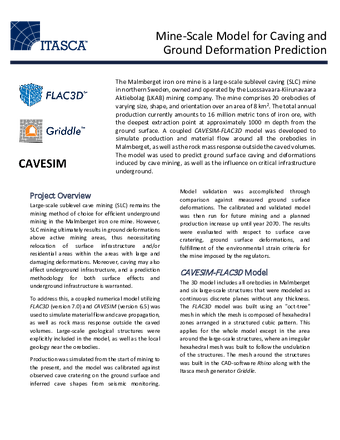
Mine-Scale Model for Caving and Ground Deformation Prediction
A coupled CAVESIM-FLAC3D model was developed to simulate production and material flow around all the orebodies in Malmberget, as well as the rock mass response outside the caved volumes. The model was used to predict ground surface caving and deformations induced by cave mining, as well as the influence on critical infrastructure underground.
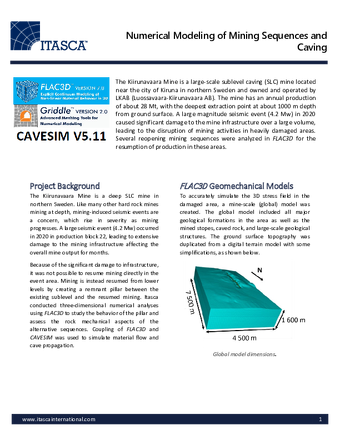
Numerical Modeling of Mining Sequences and Caving
A large magnitude seismic event (4.2 Mw) in 2020 caused significant damage to the Kiirunavaara Mine infrastructure over a large volume, leading to the disruption of mining activities in heavily damaged areas. Several reopening mining sequences were analyzed in FLAC3D for the resumption of production in these areas.
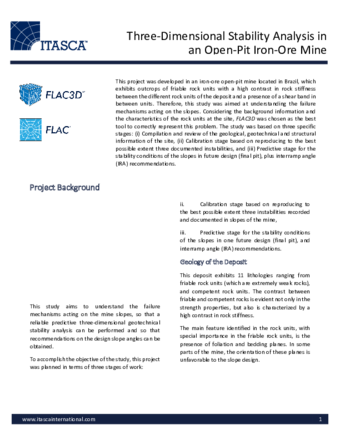
Three-Dimensional Stability Analysis in an Open-Pit Iron-Ore Mine
This project was developed in an iron-ore open-pit mine located in Brazil, which exhibits outcrops of friable rock units with a high contrast in rock stiffness between the different rock units of the deposit and a presence of a shear band in between units. Therefore, this study was aimed at understanding the failure mechanisms acting on the slopes. Considering the background information and the characteristics of the rock units at the site, FLAC3D was chosen as the best tool to correctly represent this problem. The study was based on three specific stages: (i) Compilation and review of the geological, geotechnical and structural information of the site, (ii) Calibration stage based on reproducing to the best possible extent three documented instabilities, and (iii) Predictive stage for the stability conditions of the slopes in future design (final pit), plus interramp angle (IRA) recommendations.
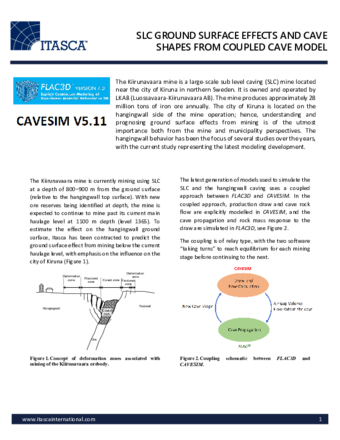
SLC GROUND SURFACE EFFECTS AND CAVE SHAPES FROM COUPLED CAVE MODEL
The latest generation of models used to simulate the SLC and the hangingwall caving uses a coupled approach between FLAC3D and CAVESIM. In the coupled approach, production draw and cave rock flow are explicitly modelled in CAVESIM, and the cave propagation and rock mass response to the draw are simulated in FLAC3D.

Large-scale Footwall Stability at the LKAB Kiirunavaara Mine
The Kiirunavaara Mine, located near the city of Kiruna in northern Sweden, is a large-scale sublevel caving (SLC) operation producing 28 Mt (million metric tons) of iron ore per year. Originally an open pit operation, the mine later transitioned to underground SLC operations in the late 1950s. As mining has progressed deeper, a damaged zone in the footwall has been noted during annual damage mapping of decommissioned infrastructure left behind from previous mining stages. The rock mass fracturing associated with the damaged zones was explicitly studied by a set of models in PFC. These models focused on the interaction between the caving hangingwall, the developing cave rock zone, and the footwall damage development.
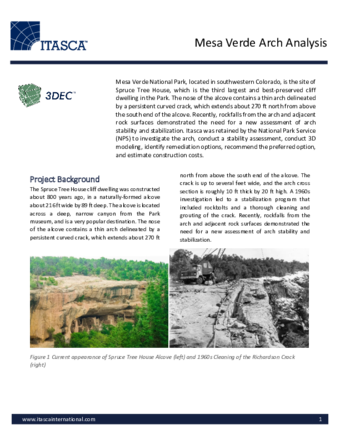
Mesa Verde Arch Analysis
Mesa Verde National Park, located in southwestern Colorado, is the site of Spruce Tree House, which is the third largest and best-preserved cliff dwelling in the Park. The nose of the alcove contains a thin arch delineated by a persistent curved crack, which extends about 270 ft north from above the south end of the alcove. Recently, rockfalls from the arch and adjacent rock surfaces demonstrated the need for a new assessment of arch stability and stabilization. Itasca was retained by the National Park Service (NPS) to investigate the arch, conduct a stability assessment, conduct 3D modeling, identify remediation options, recommend the preferred option, and estimate construction costs.
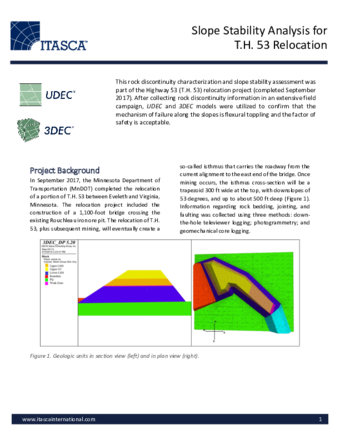
Slope Stability Analysis for T.H. 53 Relocation
This rock discontinuity characterization and slope stability assessment was part of the Highway 53 (T.H. 53) relocation project (completed September 2017). After collecting rock discontinuity information in an extensive field campaign, UDEC and 3DEC models were utilized to confirm that the mechanism of failure along the slopes is flexural toppling and the factor of safety is acceptable.
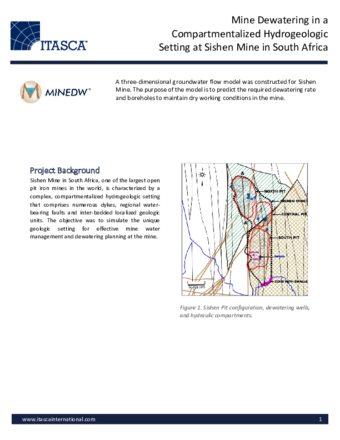
Mine Dewatering in a Compartmentalized Hydrogeologic Setting at Sishen Mine in South Africa
A three-dimensional groundwater flow model was constructed for Sishen Mine. The purpose of the model is to predict the required dewatering rate and boreholes to maintain dry working conditions in the mine.

ROCK MECHANICAL ANALYSES FOR THE BOLIDEN DEEP REPOSITORY AT RÖNNSKÄR
Boliden AB is constructing an underground repository for final storage of process waste material from the Rönnskär copper smelter facility. Itasca was contracted by Boliden to carry out rock mechanical analysis to assess the stability in both the short- and long-term (3000 years) perspectives. FLAC3D and 3DEC models were used to study global and local stability as well as the potential for long-term effects on flow paths in the rock mass resulting from the excavation of the repository.
Simulation of 3D Pore‐Pressure Distributions for Slope Stability Analysis
MINEDW was used to simulate pore‐pressure distributions at the Chuquicamata open‐pit mine slope in Chile, which is the largest copper mine in the world by excavated volume.
